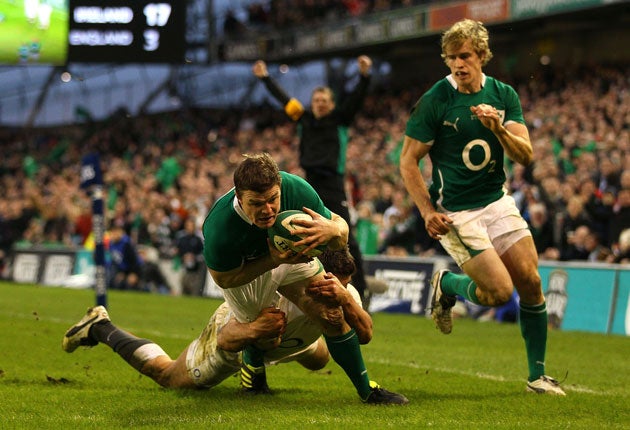O'Driscoll the great has Irish believing in BOD

You do not have to be Irish to appreciate greatness in green. When Brian O'Driscoll crossed the line for Ireland's second try he eclipsed a record established 78 years ago by Ian Smith, the "Flying Scot", for the number of tries scored in the Five or Six Nations' Championship. That O'Driscoll has taken rather longer to achieve it than Smith is neither here nor there.
O'Driscoll, 32 and in his 112th Test (all but one of which he has started), has been an adornment of the modern era. Smith played in 32 games between 1924 and 1933, a career of considerable longevity for those days, and scored 24 tries; O'Driscoll made his Ireland debut in 1999 and now has 25 (and 44 in all internationals) as well as the respect of both hemispheres and the captaincy of his country and the Lions.
He has been a lodestar for Ireland, in bad times as well as good, and if Matt Banahan, who may become a regular in the England centre, remembers anything of yesterday it should be that he played against one of the greats.
There is a phrase beloved of coaches, that their side tried to play too much rugby. England tried to do that, displayed their naivety, and within a half-hour were 14 points down. The definitive figures were in green – Jonathan Sexton, Tommy Bowe, Sean O'Brien – and at their backs they could call on so much experience. Twice as much as England, in fact. Throughout this Six Nations England have been the least experienced of teams, even more so here for the absence of their injured captain, Mike Tindall. When England last won in Dublin, in 2003, they had been there and done itand Tindall was a young man surrounded by quality.
Here, England tried to play without putting building blocks in place and Ireland preyed on every error. Declan Kidney and his coaching staff, much criticised in their own land for a lacklustre return this season, had noted England's perceived strengths at scrum time, at half-back, in the back three, and then blunted each of them. At the first scrum, Ireland forced a penalty. They created blind alleys for Ben Youngs to run up and, as it turned out, towards a yellow card.
If there was a wandering wing to be seen, the role for which Chris Ashton has been so widely praised, it was Bowe. The Osprey came into this match with 38 caps, together with experience of a Grand Slam and a Lions tour the same year, 2009. Ashton, winning his 11th cap, has none of these things; he is a player of considerable promise but he is, like his team, a work in progress.
Ireland's mood coming into the game was grim. Kidney coached them to that Slam, then to second place last year, and now the best they could hope for was third, reviving memories of 2007, when their preparation for the World Cup fell further apart the nearer the global tournament came. Aside from that has been the issue over the No 10 jersey and whether Sexton, the younger man, should start ahead of the veteran Ronan O'Gara.
Ireland have been here before, of course, with O'Gara and David Humphreys and with Ollie Campbell and Tony Ward in the 1970s. Nor did Sexton have the greatest of games in Cardiff eight days ago, when he replaced O'Gara. But yesterday evening he put all that behind him. When England were at their most vulnerable, early in the game, his tactical kicking was everything that even O'Gara would have wanted; he kicked his goals and his was the quickly-taken tapped penalty that created the first try, for Bowe.
When, with 10 minutes left, O'Gara replaced Sexton to hammer down the remaining coffin nails, the Leinster man was given a resounding farewell by the crowd and acclaimed man of the match. They knew the game was won and the role Sexton had played.
O'Driscoll will take Ireland to the World Cup in New Zealand in September with greater optimism than before.
Join our commenting forum
Join thought-provoking conversations, follow other Independent readers and see their replies
0Comments